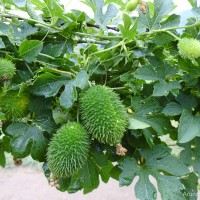
Annual or (?) perennial, dioecious. Stem slender, subcompressed, 2-edged, glabrous, young parts glabrous. Leaves long-petiolate; lamina 4.5—11(-12.5) x 3.5—8 cm, lanceolate to ovate-lanceolate in outline, very acute to acuminate, deeply, broadly cordate at base, shallowly to somewhat deeply 3—5(-7)-lobed, remotely dentate to denticulate, glabrous, punctate to varying degrees on both surfaces; petiole 1—5 cm long, glabrous to subglabrous. Male flowers axillary-racemose, up to 6 in each raceme, branches or peduncles very slender, minutely pubescent with minute bract c. 0.5 mm long above midway; calyx lobes 5 x 1.5 mm long, narrowly lanceolate, acuminate, free almost to base, glabrous, except at very base, where shortly patent-hirsute; corolla lobes c. 1 cm long, broadly lanceolate, acute, pubescent. Female flowers solitary, c. 3.5 cm long, long pedunculate; peduncle 2.5—8.5 cm long, with small, 2.5 mm long bract about or just below midway; calyx lobes c. 6 mm long, narrowly lanceolate, more slender than in male; corolla lobes c. 2.75 cm long, lanceolate, pubescent. Ovary 6—8 mm, long-acute papillose. Fruit 3.5 x 2 cm, excluding beak, ovoid, covered overall with short, acutely conical processes. (FOC)

.jpg)
.jpg)
.jpg)

.jpg)
.jpg)
.jpg)
